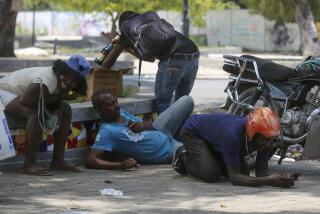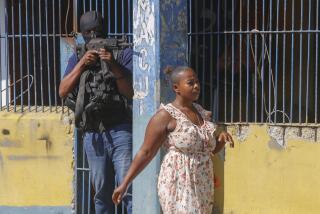A Shift by Exiled Haiti Leader Called Key to Talks : Caribbean: Diplomats say President Aristide must drop his demand that Gen. Cedras resign immediately.
- Share via
PORT-AU-PRINCE, Haiti — A successful outcome to the crucial talks beginning Sunday in New York between exiled Haitian President Jean-Bertrand Aristide and the man who ousted him, Gen. Raoul Cedras, depends almost entirely on a serious policy change by Aristide, according to diplomats and other experts.
“The only chance for a settlement is for Aristide to back off from his demands for an immediate resignation by Cedras and an acceptance of a new government in place before he returns,” a European diplomat said.
Although Aristide, under strong pressure from the United States, Canada and France, publicly dropped demands that Cedras had to resign immediately as a condition to the meeting, his supporters say that will still be his essential position when the talks begin.
Aristide is expected to start by demanding that Cedras and the military high command, as well as Port-au-Prince Police Chief Michael Francois, resign immediately; that an exact date be set for his return at the outset; that a new prime minister be named, and that the latest congressional elections be set aside.
There will be no problems with the last two points, diplomats say. But if Aristide insists on the immediate resignation of Cedras and an exact date for his own return without a new government already in place, the talks are likely to end dismally.
“If he does that, the negotiations are dead,” said a Haitian political expert who is expected to be part of any new government resulting from the talks. “He has to be rational and realize the consequences of keeping strictly to his demands.”
Other sources said those consequences include a military coup against Cedras and probable chaos and bloodshed in the streets.
“Cedras is going to New York to negotiate a surrender,” the European diplomat said, “but for it to work, Aristide has to accept a controlled structure of change.”
That means first naming a new government acceptable to both Aristide, his civilian opposition, the military and the wealthy supporters of the coup that ousted him in September of 1991.
While Cedras and the other members of the military command, as well as the powerful Francois, will have to agree to step down, they should be able to stay perhaps a month or two, the source said.
In the meantime, a new military command structure would be named, a date for Aristide’s return would be negotiated and an arrangement reached on separating the army from the police. There would also need to be a signed agreement on bringing in foreign military advisers and police experts.
According to diplomats and other international officials, Cedras is willing to go along on all these points. But some skeptics say he has agreed only because he is certain that Aristide will not, so that blame for failure of the talks would shift to the president.
“The idea,” according to a businessman who supports Aristide but who maintains strong contracts with the military, “is that Aristide will balk, the military will say, ‘See, we agreed,’ and the international community will give up on Aristide.”
If that scenario plays out, he said, “the military and its backers expect the international community to ease back the embargo and accept the fact that Aristide can’t be brought back except on the backs of foreign troops.”
Other diplomats, however, say they are pleased with Cedras’ attitude, although they attribute his flexibility to a realization that he cannot cling to power much longer.
Driving Cedras’ alleged rationality is the strengthened embargo authorized this month by the U.N. Security Council aimed at cutting off nearly all petroleum imports and freezing the assets of the regime and its civilian supporters.
Haiti, which produces no oil and has no refining capacity, is thought to have about two to three months of petroleum supplies stored, depending on how they are rationed.
Trucks carrying oil have been spotted crossing the border from the Dominican Republic in the last two days in violation of the embargo. But a large ocean tanker that had been expected this week did not arrive, driving home to Cedras his country’s isolation.
Gas stations have been closing at night and on Sundays, sales of gasoline have been restricted, and some neighborhoods have electric power cut back to between four and eight hours a day.
As the embargo pinches harder, oil company sources say more severe rationing can be expected. Gas prices in some rural areas have nearly tripled in a week.
U.N. and other diplomats closely involved in the negotiations said there is no chance that the embargo would be relaxed or lifted during the Cedras-Aristide talks.
“If we let in just one tanker, it would lengthen the time they (the military) could hold out,” one diplomat said. “So there won’t be any letup in the pressure.”
All of this would seem to give Aristide an unshakable advantage in the New York talks. But sources say that earlier this week, he weakened his standing, particularly with the United States, France, Canada and special U.N. mediator Dante Caputo, by seeming to condition his participation in the talks on Cedras’ immediate resignation.
The talks had been scheduled for U.N. headquarters. But diplomats said late Friday that because of security concerns, they will be held instead on Governor’s Island off the tip of Manhattan, Reuters news agency reported.
More to Read
Sign up for Essential California
The most important California stories and recommendations in your inbox every morning.
You may occasionally receive promotional content from the Los Angeles Times.













